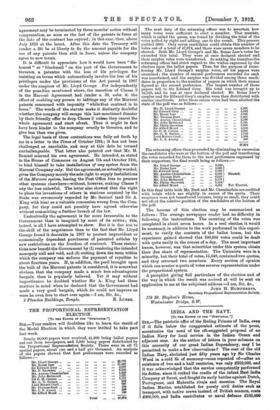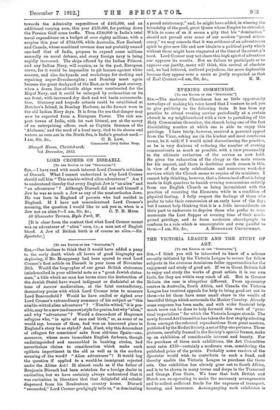INDIA AND THE NAVY.
[TO MI EDITOR OP TER " SPECTATOR."]
SIR,—The patriotic offer of the Ruling Princes of India, even if it falls below the exaggerated estimate of the press, accentuates the need of the oft-suggested proposal of an Indian Navy for local service in the Indian Ocean and adjacent seas. As the author of letters in your columns on this necessity of our great Indian Dependency, may I be permitted to make a few observations? The cost of the old Indian Navy, abolished just fifty years ago by Sir Charles Wood in a cold fit of economy—soon repented of—after an existence of two and a half centuries, was only 2350,000, and it was acknowledged that the service competently performed its duties, since it rooked the cradle of the infant East India Company at Surat, and fought its early battles against Dutch, Portuguese, and Mahratta rivals and enemies. The Royal Indian Marine, established for purely civil duties such as transport, with native crews instead of British seamen, costs 2300,000, and India contributes or naval defence 2105,000 towards the Admiralty expenditure of 2405,000, and an additional varying sum, this year 2135,000, for putting down the Persian Gulf arms traffic. Thus 2240,000 is India's total naval expenditure on a budget of over eighty millions, with a surplus this year of 0744,000, while Australia, New Zealand, and Canada, whose combined revenue does not probably exceed one-half that of India, propose to expend some millions annually on naval defence, and every foreign navy is being rapidly increased. The ships offered by the Indian Princes, and any Indian Navy, will require, as in the past, European crews, for it would be impossible to pit lascars against white seamen, and also dockyards and workshops for docking and repairing super-Dreadnoughts ; and Bombay must again become the great dockyard of the East, as in the past century, when a dozen line-of-battle ships were constructed for the Royal Navy, and it could be enlarged by reclamation on its sea front, with increased dry dock and wet basin accommoda- tion. Gunnery and torpedo schools could be established at Butcher's Island, in Bombay Harbour, as the former were in the old Indian Navy days. It is from the sea that danger may now be expected from a European Power. The rich sea- port towns of India, with its vast littoral, are at the mercy of an enterprising officer, such as Captain Semmes of the Alabama,' and the need of a local navy, tied to its shores and waters, as ours are in the North Sea, is India's greatest need.— Commander (late) Indian Nary, Stanpit House, Christchurch: ?rd December, 1912.







































































 Previous page
Previous page